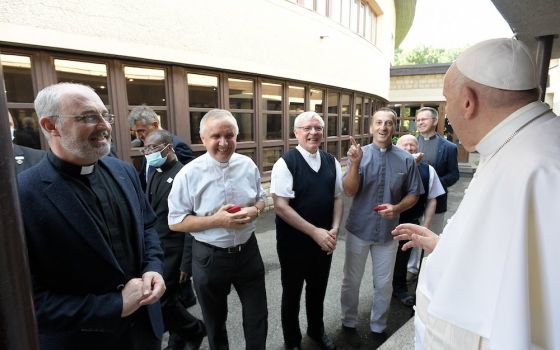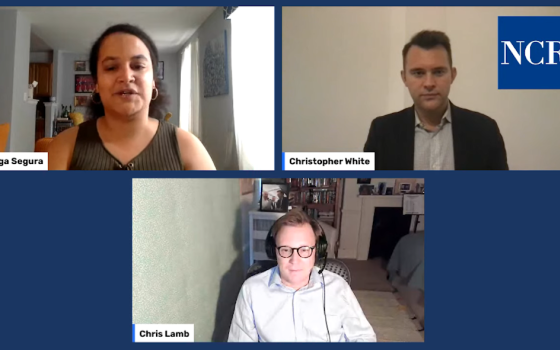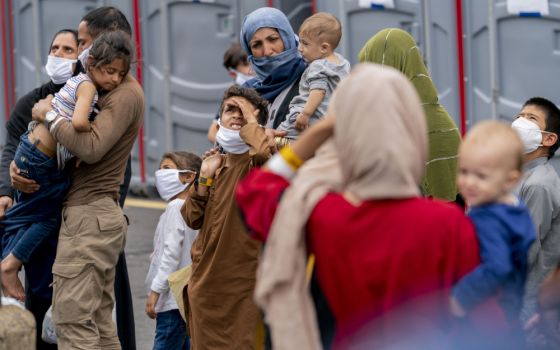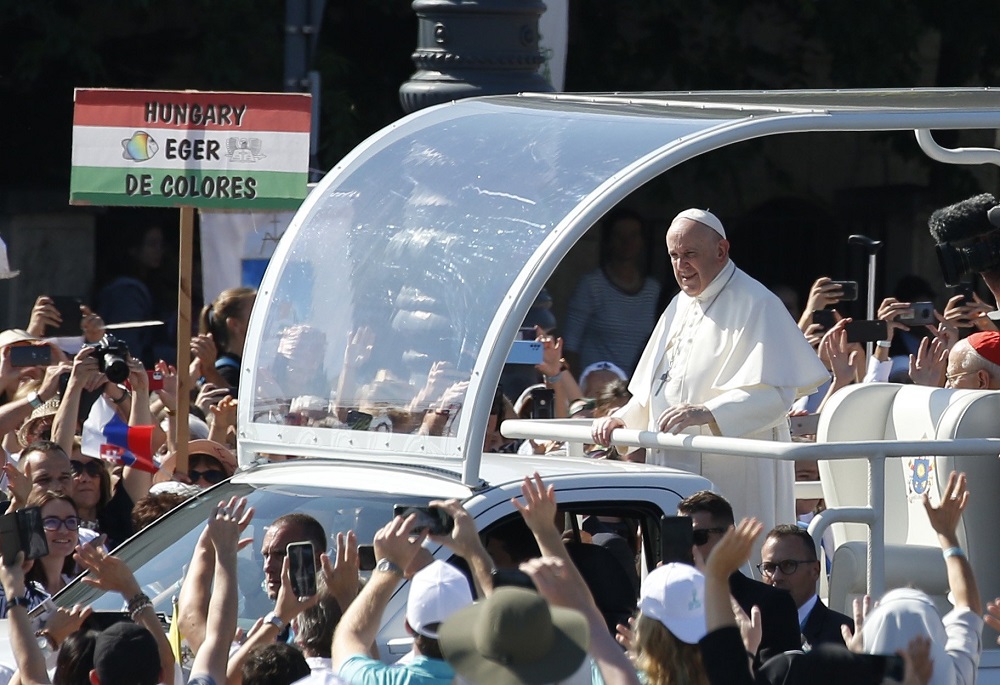
Pope Francis greets the crowd before celebrating the closing Mass of the International Eucharistic Congress at Heroes' Square in Budapest, Hungary, Sept. 12, 2021. (Paul Haring/CNS)
Pope Francis delivered an implicit rebuke of political strongmen as he arrived in the Hungarian capital Sept. 12, warning of the "risk of proclaiming a false Messianism, one of human origins, not from God."
"We too would prefer a powerful Messiah rather than a crucified servant," said the pope in presence of the country's ultranationalistic Prime Minister Viktor Orban, encouraging the majority Catholic nation to mirror the example of Christ's humility and eschew the temptations of power.
In recent years, prominent right-wing public intellectuals, activists and lawmakers, including former U.S. President Donald Trump, have hailed Hungary and its defiant leader as a likely model of salvation through politics.
But upon touching down in the Central European nation, the leader of 1.3 billion Catholics offered a very different message.
"How distant is the God who quietly reigns on the cross from the false god that we want to reign with power in order to silence our enemies!" said Francis. "How different is Christ, who presents himself with love alone, from all the powerful and winning messiahs worshiped by the world!"
Few figures on the world scene could be more diametrically opposed than the pope and Hungary's prime minister.
The 84-year-old Francis has made global engagement a centerpiece of his eight-year pontificate, frequently championing the cause of migrants and refugees as a primary concern. By contrast, the 58-year-old Orban has made isolationist, anti-immigrant policies the heart of his political platform, seeking to mold himself as a defender of Christianity and traditional values in an increasingly secularized and pluralistic Europe.
"The more migrants that come, the more Christian values will be watered down," he said in 2019, arguing that immigration is a "a Trojan horse for terrorism."
Orban's strident populism has made Hungary a semi-pilgrimage destination for the likes of former Trump advisor Steve Bannon, Fox News host Tucker Carlson, conservative author Rod Dreher and Alexander Tschugguel, whose theft of the so-called "Pachamama" statues during the Vatican's Synod of Bishops on the Amazon in 2019 garned him popularity among traditionalist Catholics.
The pope's journey in the country took on a different focus.
Advertisement
"There is God's side and the world's side," Francis said during the closing Mass for the 52nd International Eucharistic Congress in Budapest.
The semi-annual Catholic event, which began on Sept. 5, dates back over a century and aims to promote the Eucharist as central to Catholic life and identity.
Set against the backdrop of a sun-drenched Heroes' Square with towering monuments to the nation's historical figures, the pope juxtaposed a world that pursues "self importance and power" to a Christian way of living, which shuns "imposition, ostentation and triumphalism."
Despite Orban's fortress mentality when it comes to Europe and harsh rhetoric against outsiders, Francis has met Orban on at least two prior occasions at the Vatican. During the eucharistic congress, the prime minister was seated on the front row during the outdoor Mass, which was preceded by a private meeting with the pope, along with Hungarian President János Áder.
According to an official press statement from the Vatican, the pope's 40-minute meeting with the Hungarian leaders included a discussion on "the role of the Church in the Country, the commitment to the protection of the environment, the protection and promotion of the family."
While the official statement from the Vatican made no mention of migration, Orban took to social media after the meeting to note that he asked the pope "not to let Christian Hungary perish."
Orban, who is up for reelection next year, seeking to secure a fourth consecutive term as prime minister, is a member of the Calvinist Hungarian Reformed Church, while his wife and their children are Catholic.
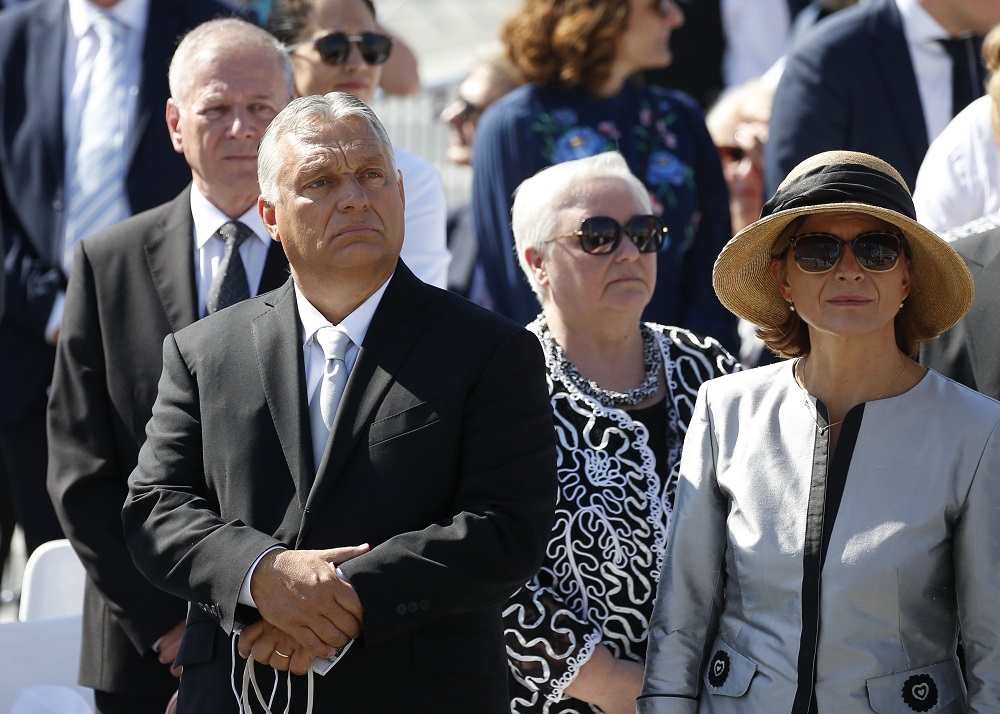
Hungarian Prime Minister Viktor Orbán and his wife, Anikó Lévai, are pictured before the start of Pope Francis' celebration of the closing Mass of the International Eucharistic Congress at Heroes' Square in Budapest, Hungary, Sept. 12, 2021. (Paul Haring/CNS)
The pope spent less than seven hours on the ground in Hungary before departing for Bratislava, Slovakia, where he will spend three and a half days.
In recent weeks, the Vatican has sought to distance itself from criticism that the pope's short stay in Budapest was an intentional slight against Orban. The pope himself has insisted that the reason for his trip was spiritual in nature, rather than for an official state visit.
Francis' visit to Hungary, the 34th international trip of his papacy, marked his first time traveling since the pope spent 10 days in a Roman hospital during July where he had half of his colon removed.
Ahead of Mass, the pope also met with representatives of the Ecumenical Council of Churches and Jewish leaders in Hungary, which comprises one of the world's largest Jewish communities outside of Israel.
As he has done repeatedly throughout this papacy, Francis again denounced rising anti-Semitism in Europe and beyond, characterizing it as "a fuse that must not be allowed to burn."
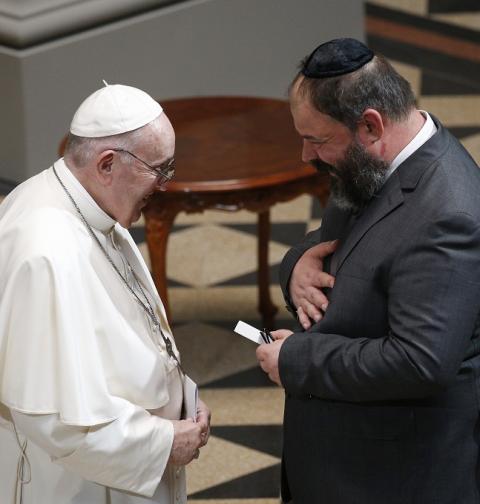
Pope Francis greets a religious leader during a meeting with representatives of the Ecumenical Council of Churches and several Jewish communities of Hungary at the Museum of Fine Arts in Budapest, Hungary, Sept. 12, 2021. (Paul Haring/CNS)
"The best way to defuse it is to work together, positively, and to promote fraternity," he said.
The pope went on to reflect on the image of Budapest's iconic Széchenyi Chain Bridge, which spans the Danube River, connecting the city's eastern and western neighborhoods.
"The bridge does not fuse those two parts together, but rather holds them together," he told the interfaith leaders. "That is how it should be with us too."
"Whenever we were tempted to absorb the other, we were tearing down instead of building up," Francis added. "Or when we tried to ghettoize others instead of including them. How often has this happened throughout history! We must be vigilant and pray that it never happens again."
Prior to departing the country, the pope again reiterated his central themes of a Christianity defined by its hospitality and humility as he offered the Sunday Angelus to what local authorities estimated to be more than 100,000 pilgrims.
"Religious sentiment has been the lifeblood of this nation, so attached to its roots. Yet the cross, planted in the ground, not only invites us to be well-rooted," said Francis. "It also raises and extends its arms towards everyone."
"The cross urges us to keep our roots firm, but without defensiveness; to draw from the wellsprings, opening ourselves to the thirst of the men and women of our time," he concluded. "My wish is that you be like that: grounded and open, rooted and considerate."





